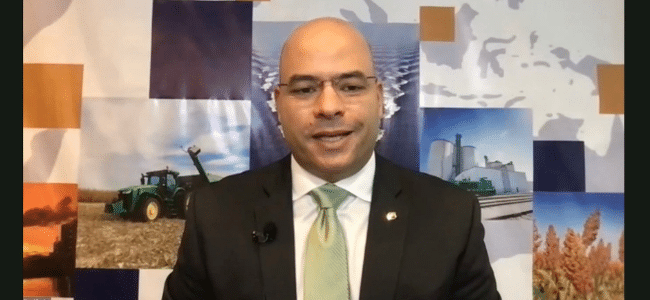A shifting fuel standard in Australia could allow a larger role for ethanol in that market. To better understand the changes, the U.S. Grains Council’s (USGC’s) Southeast Asia office presented “Ethanol: Decarbonization of Transport Fuel in the Bioeconomy” on Aug. 25.
Partnering with Bioenergy Australia and Manildra Group Australia, the program promoted the use of ethanol as a readily available source to reduce greenhouse gas (GHG) emissions.
“The event aimed to showcase how studies and policies in Australia, the United States and the Philippines have shown they aid in decarbonizing the transportation system through the use of ethanol,” Kent Yeo, USGC’s regional ethanol consultant for Southeast Asia, said.
More than 250 registrants from 16 countries participated, including government officials, biofuels policymakers, environmental agencies, oil company executives, ethanol producers and traders, research institutions, biofuels tech companies, news agencies and public relations firms.
Manuel Sanchez, USGC’s regional director for Southeast Asia and Oceania, Levin Flake, counsellor at the U.S. Embassy in Canberra Foreign Agricultural Services and Shahana McKenzie, CEO of Bioenergy Australia, kicked off the event by providing opening remarks.
“Studies, including a recent one by the U.S. Department of Energy, continue to show that U.S. ethanol is increasingly becoming more efficient, and the carbon intensity of production continues to decrease relative to gasoline. In addition, the U.S. is committed to expanding the infrastructure necessary to benefit from even higher biofuel blends,” Flake said.
McKenzie expressed appreciation for the programming while also providing insight on ethanol usage within Australia.
“It has been really exciting to partner with USGC and Manildra Group in organizing this successful webinar and to jointly launch the new study on aromatics pool reduction in Australia’s Fuel Standards via the use of ethanol,” McKenzie said.
“The proposed shift in the fuel standards presents a viable mechanism for the increase in ethanol usage within fuels in Australia, and the reduction of aromatics levels using ethanol can generate significant economic and societal benefits for the country.”
Attendees had the opportunity to hear from a panel of globally recognized experts and industry leaders, who presented their knowledge, experiences and studies on the subject.
Speakers included Keith Sharp and Bhavisha Kallichurn from TfA Project Group in Australia, Chris Bliley, senior vice president of regulatory affairs at Growth Energy, and Dr. Rex B. Demafelis, professor and chairman of the Interdisciplinary Biofuels Research Study Center at the University of Philippines-Los Banos.
The group discussed a variety of topics, from the reduction in aromatics in Australia’s fuel standards to ethanol production and use in the Philippines.
Attendee, Dr. Tirto Prakoso, senior researcher from Institut Teknologi Bandung and chairperson of the ITB Centre for Sustainable Development Goals, agreed with the information presented at the webinar, saying, “The success of countries like Australia, the U.S., Thailand and the Philippines in the application of bioethanol programs should be a lesson for Indonesia on how to introduce bioethanol in the domestic market. Bioethanol can help the Indonesian government’s agenda in reducing carbon emissions from transportation.”
The program concluded with a panel discussion to address attendees’ questions and assess their views on the future of ethanol’s role in transport fuel decarbonization. Geoffrey Bell, chief executive officer and chairman at Microbiogen in Australia, moderated the discussion.
“The Council and its partners hope the information presented will encourage countries in the region to embrace ethanol through harmonization of standards, regulations and the building of public confidence in ethanol as a desirable renewable fuel and oxygenate in their economy,” Yeo said.
Learn more about ethanol in Southeast Asia and Oceania.
About The U.S. Grains Council
The U.S. Grains Council develops export markets for U.S. barley, corn, sorghum and related products including distiller’s dried grains with solubles (DDGS) and ethanol. With full-time presence in 28 locations, the Council operates programs in more than 50 countries and the European Union. The Council believes exports are vital to global economic development and to U.S. agriculture’s profitability. Detailed information about the Council and its programs is online at www.grains.org.

